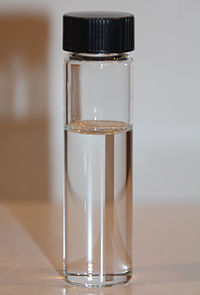
Photo from wikipedia
Abstract Borrowing Hydrogen (BH), also called Hydrogen Autotransfer (HA), reaction with neat ethylene glycol represents a key step in the preparation of β-amino alcohols. However, due to the stability of… Click to show full abstract
Abstract Borrowing Hydrogen (BH), also called Hydrogen Autotransfer (HA), reaction with neat ethylene glycol represents a key step in the preparation of β-amino alcohols. However, due to the stability of ethylene glycol, mono-activation has rarely been achieved. Herein, a combination of Pd/C and ZnO is reported as heterogeneous catalyst for this BH/HA reaction. This system results in an extremely air and moisture stable, and economic catalyst able to mono-functionalize ethylene glycol in water, without further activation of the diol. In this work, different diols and aromatic amines have been explored affording a new approach towards amino alcohols. This study reveals how the combination of two solid species can afford interesting catalytic properties in heterogeneous phase. ZnO activates ethylene glycol while Pd/C is the responsible of the BH/HA cycle. This catalytic system has also been found useful to dehydrogenate indoles affording indolines that undergo in situ BH/HA cycle prior to re-aromatization, representing a tandem heterogeneous process.
Journal Title: Tetrahedron
Year Published: 2017
Link to full text (if available)
Share on Social Media: Sign Up to like & get
recommendations!